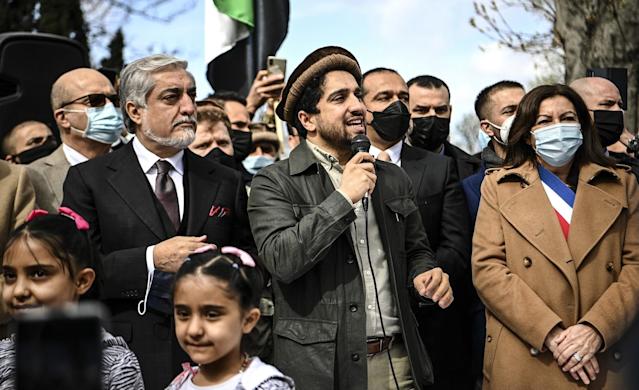Jeremy Beaman

The son of a powerful Afghan resistance commander who once fought against the Taliban declared he is “ready to follow” in his father’s footsteps and take up arms against the Islamist military organization now in control of his homeland.
Ahmad Massoud, who resides in one of the few remaining regions in Afghanistan not under Taliban control, pleaded for help from the West as he promised to oversee his own resistance mission nearly 20 years after his father, Ahmad Shah Massoud, was killed by assassins from al Qaeda.
“I write from the Panjshir Valley today, ready to follow in my father’s footsteps, with mujahideen fighters who are prepared to once again take on the Taliban,” Massoud, leader of the National Resistance Front of Afghanistan, wrote in an op-ed published by the Washington Post on Wednesday. “We have stores of ammunition and arms that we have patiently collected since my father’s time, because we knew this day might come.”
GOP LEADERS ASK BIDEN FOR CLASSIFIED ‘GANG OF EIGHT’ BRIEFING ON AFGHANISTAN
Panjshir, a province located northeast of Kabul where former Afghan vice president Amrullah Saleh fled in recent days, contains one of the only stretches of territory inside Afghanistan outside of Taliban control.
Massoud said his father gathered resistance fighters in the same region as a mujahideen commander when the Taliban controlled Afghanistan before the turn of the century.
The elder Massoud — who was assassinated on Sept. 9, 2001, two days before al Qaeda terrorists killed nearly 3,000 people in attacks within the United States — died “fighting for the fate of Afghanistan but also for the West,” his son said.
Saleh, who joined anti-Taliban forces this week, declared himself the “legitimate caretaker president” on Tuesday after President Ashraf Ghani fled the country ahead of the Taliban’s advance into Kabul on Sunday.
“We have lost territory but not legitimacy,” Saleh told the New York Times in an interview published Wednesday. “I, as caretaker president, upholder of the Constitution, don’t see the Taliban emirate either as legitimate or national.”
Massoud said Afghans have already responded to his call for resistance in the Panjshir Valley, including members of the Afghan Special Forces and others from the Afghan army who “were disgusted by the surrender of their commanders and are now making their way to the hills of Panjshir with their equipment.”
However, their arms would not be enough to overcome a Taliban assault, Massoud wrote, citing shared interests in an appeal to the West for weapons and ammunition.
“Know that millions of Afghans share your values,” Massoud said. “We have fought for so long to have an open society, one where girls could become doctors, our press could report freely, our young people could dance and listen to music or attend soccer matches in the stadiums that were once used by the Taliban for public executions — and may soon be again.”
Ahmad Massoud, son of late Afghan commander Ahmad Shah Massoud, center, speaks to supporters. (Christophe Archambault/Pool Photo via AP)
“The Taliban is not a problem for the Afghan people alone,” Massoud also said. “Under Taliban control, Afghanistan will without doubt become ground zero of radical Islamist terrorism; plots against democracies will be hatched here once again.”
The Biden administration has yet to divulge its strategy in dealing with the Taliban’s reascension to power in Kabul. Administration officials have said their current priority is evacuating U.S. citizens, which could number up to 15,000, along with eligible Afghans and others who seek to take shelter in the U.S.
Although officials have been slow to reveal what the administration plans to do beyond the president’s Aug. 31 withdrawal deadline, Biden said in an interview segment aired Wednesday that U.S. forces would remain in Afghanistan to continue its evacuation of U.S. citizens beyond that date if necessary.
“If there’s American citizens left, we’re gonna stay to get them all out,” Biden told ABC’s George Stephanopoulos.
Washington Examiner














